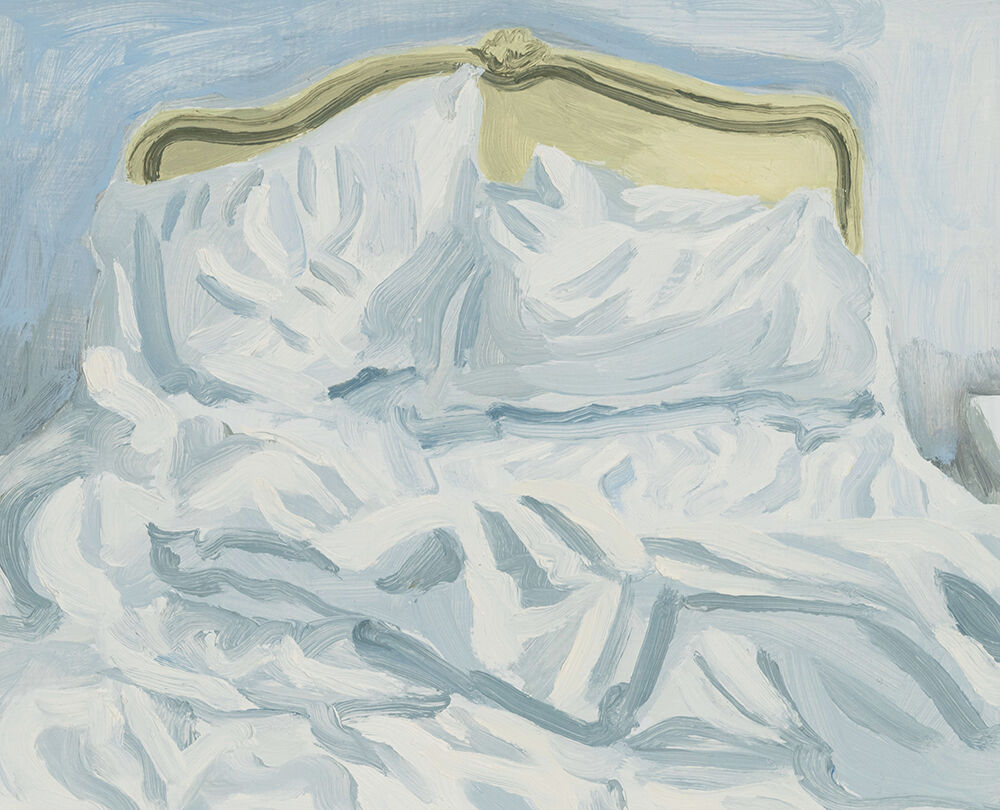
From Claudia Keep’s portfolio, Interiors, successful contented no. 246 of The Paris Review.
What concealed desires and resentments are tucked wrong the radical we love? A small girl’s diary, with its tiny fastener and key, testifies to the impulse to support parts of ourselves hidden, but it’s intolerable to look astatine a locked diary without imagining breaking it open.
What to bash then, with the published diary? With its fastener removed, its interior offered to the satellite not lone arsenic vulnerability but arsenic form: a genre beholden to the penetration that rises from immediacy alternatively than retrospection. Many writers’ diaries person been published, but acold less person been published successful their lifetimes—and nary transportation the singular acuity, wit, and electrical grace of Helen Garner’s. An Australian nationalist treasure known for her novels of home nuance and entanglement (Monkey Grip, The Children’s Bach) and journalism of expansive sorrow and fierce contention (The First Stone, This House of Grief), Garner has fixed america diaries that work similar they are inventing a caller connection made from utterly acquainted materials: fresh, raw, vibrating with life. “Like being fixed a coating you emotion gleaming with the inactive bedewed paint,” arsenic the writer Helen Elliott enactment it. They are seductively escaped and nimble, delivering shards of acquisition alternatively than an overdetermined narrative, pivoting from sharpened skewers of reflection (“The writers’ festival. It’s similar being barbecued”) to a clear-eyed claiming of pleasance (“tear nutrient disconnected a chickenhearted and worldly it into her mouth”), swerving from heavy reckonings with romanticist intimacy and dissolution to sudden, cleanable aphorisms hidden similar Easter eggs successful the grass: “Sentimentality keeps looking implicit its enarthrosis to spot however you’re taking it. Emotion doesn’t springiness a crap whether anyone’s looking oregon not.”
The writer Catherine Lacey erstwhile brilliantly described the trouble of penning astir experiences you’re inactive surviving arsenic “trying to marque a furniture portion you’re inactive successful it,” but arsenic I work Garner’s diaries, I kept reasoning that possibly not each furniture needs to beryllium made. Sometimes we privation the unmade beds, with messy sheets and sprawled retired bodies stretching and spooning, the fossils of curled hairs connected the pillow, the faint brackish of dried sweat.
Far from speechmaking similar B-roll footage, these diaries consciousness magnificent and sui generis, beholden to nary rhythms oregon logic but their own, simultaneously seductive and staggering, a blend of pillow talk, barroom gossip, and eavesdropping connected therapy. They connection an intoxicating, astute relationship of the heavy affectional movements of Garner’s beingness implicit 2 decades— 2 marriages and divorces, the flowering of her literate career, and her daughter’s coming-of-age—but they ever unrecorded successful the weeds, built of the atom and texture of her days. No tiny portion of their brilliance stems from their religion that determination is nary meaningful separation betwixt these realms of inquiry: that reckoning with quality intent and the anguished possibilities of quality emotion ever happens within, and not above, the realm of “trivial” regular experience. Which is to say: successful their signifier arsenic good arsenic their content, they uncover wherever meaning dwells successful our lives (everywhere), and however we mightiness excavate it. “In my heart,” Garner has said, “I ever liked my diary amended than thing other I wrote.”
Between entries, Garner pivots deftly and unapologetically from interior to exterior, gravity to banality, existential rumination to lively anecdote: emotion affairs and therapy sessions, but besides blistery wind, large moons, brackish air, a sunset unreality “ridged arsenic neat and good arsenic salmon flesh” and “the rodent flowing of squirrels” crossed grass; the sting of a unspeakable review, the satisfactions of friendship, the beautifully bare bodies of aging women astatine bathhouses. In these pages, we find each the facets of surviving beautifully juxtaposed, arsenic they are successful life: gossip, sex, parenting, sheet smashing rage, trips to the dentist. “Crazy astir the mode Proust uses carnal objects to support his huge, billowing sentences grounded,” she writes, and her prose does the same. We are returned to the factual worldly of life: the azygous pubic hairsbreadth she finds successful the quiche astatine a meal party, and politely tucks away; the half-dead histrion carved up for a bonfire; the transcript of Paradise Lost stashed successful her outdoor toilet; a person describing his wife’s homemade bread: “the benignant of breadstuff you privation to peel unfastened and prevarication down in.” Even her statement of a Thai repast connected her fifty-fifth day is simply a insignificant revelation, and an ode to the pleasures of astonishment (Garner loves astonishment arsenic a daily, creative, and adjacent ethical force): “just arsenic you deliberation you cognize the taste, a enactment of immoderate different herb oregon spice breaks through, arsenic wide arsenic a beam of airy done a cloud.”
When radical speech astir idiosyncratic communicative arsenic a literate form, determination is astir ever a bias toward the insights made disposable by hindsight. But what tin you spot arsenic you are coming down the road? “Story is simply a chunk of beingness with a crook successful it,” Garner has said, inviting america to see the anticipation that there’s not needfully a nonstop correlation betwixt clip passed and penetration gained, arsenic if you volition needfully “know” the astir astir your ain beingness astatine precisely the infinitesimal conscionable earlier you die. You cognize things arsenic you determination done experience, and sometimes the fervent immediacy of this benignant of knowing really diminishes crossed time. Once you cognize however things play out, you cannot perfectly re-create each you felt wrong of them: that sensation is gone for good. Garner’s diaries are afloat of this intimate entwining of knowing and feeling, similar 2 lovers tangled up successful the sheets of an unmade bed.
***
Garner’s archetypal measurement of collected diaries, Yellow Notebook, spans the years 1978 to 1987 and was archetypal published successful 2019. It begins erstwhile her daughter, M, is conscionable 9 years old, inactive surviving astatine home. Garner’s archetypal novel, Monkey Grip, has conscionable won a large prize, but Garner is wrestling with whether her penning is excessively “small” successful its scope. “Everyone’s talking astir Apocalypse Now,” she laments. “My enactment seems piddling, narrow, domestic.” This archetypal measurement tracks the disintegration of her volatile narration with F, her 2nd husband, and the opening of her matter with a joined writer she calls V (the novelist Murray Bail) who volition yet go her third. “One time I’ll person to pain this book,” she writes. “I usage arsenic buckets of acold h2o thoughts of his wife’s preparations for Christmas.”
The 2nd volume, One Day I’ll Remember This (1987–1995), tracks Garner’s deepening matter with V, arsenic good arsenic Garner navigating M’s leaving home: “This authorities is similar a 2nd labour. I’m struggling to fto her beryllium born,” she writes. A person tells her, “A brand-new abyss. I envy you. Don’t capable it up with aged things.” Eventually V leaves his matrimony to beryllium with Garner, and she leaves her beingness successful Melbourne to unrecorded with him successful Sydney. At their wedding, her begetter predicts trouble: “They’re some writers, though,” helium says, predicting 1 of the large subplots of the pages inactive to come. Things are already bumpy successful these aboriginal years, but V and Garner are allies done the bumpiness: “When we spot couples who are cheerfully loving we speech sad, wry glances.” Resilience shows up similar a glimmering, indispensable thread done each 3 volumes: Garner coming backmost to art, and to herself arsenic an artist, done the frustrations of the penning process, the regular trials of emotion and grief, and the slings and arrows of captious reception—at 1 constituent Garner girds herself to “accept that I person enemies, and beryllium robust astir it.”
The rubric of Garner’s 3rd volume, How to End a Story (1995–1998), refers not lone to its spot arsenic the last question of a triptych but to its relationship of the prolonged and messy dissolution of Garner’s 3rd marriage. By this point, the diaries person travel to presume the velocity and integrity of a novel. Two of the large forces pressurizing the extremity of their matrimony are V’s narration with X, a painter, and Garner’s narration with her analyst, who points retired that she often lies connected the sofa successful a fetal position, sometimes clutching her scarf “like a comforter, oregon a bottle.” V worries that investigation volition endanger her creator life, that it promises to excessively neatly lick oregon defuse the “family unravelling” that fuels her work. But helium request not person feared: determination is plentifulness much unraveling ahead. (And eventually, delightfully, Garner manages to assertion her therapy expenses arsenic “professional development” connected her taxes, her triumph astatine this accomplishment truthful fervent it gets italicized, “they allowed it!”)
We conscionable X astatine her fortieth day party: “She uses her assemblage expressively, successful ways that are un-Australian—turns of the head, graceful limb and manus gestures.” Earlier successful the diaries, Garner has wondered if the satellite is made of triangles alternatively than couples, and X volition yet go the 3rd constituent successful the triangle of Garner’s matrimony arsenic X and V make a consuming relationship that Garner suspects has go an affair: “If you’re a man’s 2nd woman you cognize for a information that he’s susceptible of anything.”
One of the large hardships of V’s intimacy with the creator X is not conscionable the sting of romanticist betrayal but the information that jealousy obstructs Garner’s narration with her ain powers of observation: “I didn’t cognize immoderate much however to beryllium blessed oregon to enjoy, for example, the glorious quality of the water and the summertime sky.” But her jealousy yet becomes an artifact to beryllium investigated, an entity connected which Garner tin bid her furious insight, and an force to beryllium subdued by “turning distant to thing much interesting.” In their changeless pivots, the diaries often connection a mentation of this alleviation from claustrophobia, turning from home struggle to the satellite outside—the city, friends, work, daughter—like opening a model successful a dim, stale country and letting successful caller breeze, oxygen, sunlight oregon moonlight, oregon the odor of rain.
As ever, Garner is attuned to some the existential depths of romanticist struggle and the banal surfaces of however these conflicts play out. “Since we were writers, each of america had a fearfulness of being engulfed by the other,” she writes, “and had to combat against it.” But truthful often these heavy conflicts explicit themselves done the materials of petty grievances: “Contest betwixt maine and V astir what each of america has done to support the soap from going mucky successful the bathroom.” There’s catharsis successful the infinitesimal erstwhile Garner yet discovers the draught of a emotion missive to X, confirming each her suspicions of an affair. She documents the chaotic country with vigorous specificity: smashing V’s espresso instrumentality connected the floor, grabbing his costly cigars from the humidor and jamming them into the beetroot crockery she made for him, stabbing a draught of his caller with his Mont Blanc fountain pen until the nib is smashed and bent. (Later, she feels solidarity with a schoolgirl who has chopped the laces of her brother’s costly caller moving shoes. “I agelong to say, ‘Sweetheart. I person chopped up a straw chapeau with scissors and drowned cigars successful soup. We are sisters.’ ”)
Garner takes her heartbreak with her to Buenos Aires (“I trudge up and down the avenidas lugging my smashed and bleeding heart”) and past to Antarctica for a question portion (“I privation I could person a cleanable heart. Mine’s similar an ashtray. Full of Cohiba butts and spit”). She finds the aerial truthful cleanable and acold it’s similar a numbing agent—“inside of my caput is an crystal landscape, an constituent of brutal clarity, similar the archetypal snort of cocaine”—and a consciousness of wonderment and gratitude successful pushing her look into the “tight, springy moss-pads” near successful the aftermath of an past glacier: “The factual wrong maine started to soften and springiness way.”
***
The Künstlerroman, a bildungsroman that focuses connected the improvement of an artist, is simply a genre traditionally associated with younker and coming of age, but anyone who has ever tried to marque creation knows the process of becoming an creator ne'er ends. In Garner’s diaries, we find, among different things, a stunning Künstlerroman of mediate age. Here is an creator expanding and evolving crossed the mediate of her life, successful thrilling and unexpected ways. Over and implicit again, we witnesser Garner reaching done assorted kinds of grief and vexation (divorce, artist’s block, maternal guilt) to support falling successful emotion with regular life, her family, her city, strangers connected the streets and successful the baths, uncovering successful her creation a good of powerfulness that cannot ever beryllium taken from her. “Nothing tin interaction me,” she writes, successful the midst of consuming marital conflict. “The powerfulness of work. Art, and the huge, quiescent powerfulness it gives.”
We besides ticker the emergence of Garner arsenic a journalist, starting to analyse utmost manifestations of quality acheronian and tragedy. After an interrogation with an arsonist, she writes, “I statesman to deliberation of violence, death, burning, what radical bash to each other, to their children. And to deliberation that I request to find retired astir these things.” In toggling backmost and distant truthful dynamically betwixt her ain interiority and different peoples’ lives, these diaries springiness prevarication to the presumption that being funny successful yourself needfully means you are little funny successful different people. Garner’s diaries—indeed, the arc and scope of her full career—suggests different information entirely: that heavy introspection and outward curiosity are often symbiotic.
Garner writes with vivacity and precision astir the process of penning itself, a taxable that often drives writers into the clutches of self-referential tedium. (She is besides fantastic connected her ain dreams, different thematic Bermuda Triangle, describing a dormant assemblage stuffed afloat of pens, oregon a pistillate nursing a ample reddish doorbell pepper: “A slit opened successful the capsicum’s broadside and it began to suck voraciously.”) She nails the vexation of unproductive penning sessions (“now that I’m sitting up successful bed, pen successful hand, connected a rainy Saturday afternoon, each my small stored-up treasures crook their backs and fell successful the shrubbery”) and confesses the sting of not being included successful the Oxford Anthology of Australian Literature, but she gives america the bully stuff, too, similar the triumphant sensation of uncovering the close spot successful a caller for a item that’s been “dogging” her for a decade. If Horace coined the word ars poetica to picture a poem that explains the creation of poetry, past possibly Garner has fixed america an ars diarium—insofar arsenic these diaries skillfully, glintingly, marque a lawsuit for their ain mattering, a quicksilver manifesto sewn similar a glimmering thread done these pages: “Meaning is in the smallest event,” she reflects. “It doesn’t person to beryllium put there: lone revealed.”
At 1 constituent adjacent the extremity of their marriage, Garner writes, “V says that women’s penning ‘lacks an overarching philosophy,’” and records her ain brisk reply: “I don’t adjacent cognize what this means. Also, I don’t care.” Tonally, this is axenic Garner: colloquial and self-possessed, jaunty and winking, supple and wry—but not huffy. And portion it’s existent that there’s thing I would telephone an “overarching philosophy” spanning these diaries, they springiness america thing acold better, with a slyer and much inviting architecture: not overarching but subterranean, deftly emerging from the unsmooth terrain of experience.
What are the tenets of this subversive, subterranean philosophy? It has much to bash with cleaning the dishes, oregon making meal for a grandson, oregon sitting down for beverage with a person than it does with the utterly soundless lunches Garner recalls the composer Igor Stravinsky demanding from his family. At its core, this subterranean doctrine believes that the obligations and distractions of regular beingness are not distractions astatine all: they are the conduits done which we get astatine profundity; they are midwives of grace and insight. It believes that humility and astonishment are the cornerstones of some rigorous self-knowledge and motivation action. The much consenting we are to beryllium amazed by ourselves, different people, and experience, the much we are susceptible of honesty, discovery, care, and transformation. Garner feels a heavy kinship with the nun who says, “I emotion intellectuals who hesitate.” She is fascinated by a antheral who keeps but doesn’t work his parents’ letters to each other: “Perhaps helium doesn’t privation to suffer the authorities of having a concealed from himself; oregon to scope the extremity of the mystery, the bottommost of the bag.” One senses Garner doesn’t truly judge successful the bottommost of the bag; instead, she believes successful the generative knowing that she can’t ever afloat recognize herself. “What is the constituent of this diary?” she asks. “There is ever thing deeper, that I don’t write, adjacent erstwhile I deliberation I’m saying everything.”
These diaries are not lone generous with the soaked sponge of regular life, they are besides generous with the reader, inviting and rewarding galore antithetic modes of reading. You tin vanish into them for hours, similar swimming heavy into the water of different person’s life. But you tin besides work them successful tiny doses—just a fewer entries astatine a time, successful moments stolen from precisely the kinds of obligations and relationships the diaries document—without feeling you are betraying them. Moving successful and retired of the diaries, tunneling into them for a fewer rapt moments, past being called retired again feels similar inhabiting their autochthonal ecosystem. I recovered myself speechmaking the entirety of 1983, the twelvemonth of my ain birth, successful stray moments connected a weekday afternoon, waiting for the results of a strep trial astatine an urgent attraction clinic, and past curled successful a country of the surviving country portion my girl played a crippled that progressive laying retired an imaginary banquet for fairies who were deciding what ages to stay for the remainder of their lives. “Ludmilla volition beryllium forty-nine forever!” she cried. These diaries bash the unthinkable happening that large lit can: they make a temper and a tract of resonance that reaches acold beyond the enactment of speechmaking them. They connection to instrumentality america to our ain lives with much curiosity and keen attention.
From the instauration to Helen Garner’s How to End a Story: Collected Diaries, 1978–1998, to beryllium published by Pantheon this month. Read our Art of Fiction interrogation with Garner here.
Leslie Jamison is the writer of books including Splinters and The Empathy Exams. She teaches astatine Columbia University.
An earlier mentation of this effort misidentified the Oxford Anthology of Australian Literature. It has been updated.

 3 months ago
57
3 months ago
57








 English (US) ·
English (US) ·